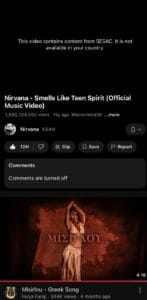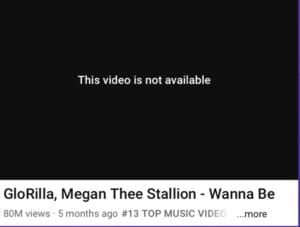YouTube removes songs from Adele, Nirvana and others due to SESAC dispute
In a surprising turn of events, YouTube has removed a large number of songs from its platform, impacting major artists such as Adele, Nirvana and many others. The action stems from a dispute involving SESAC, one of the major performance rights organizations in the United States. As the situation unfolds, it raises questions about copyright management, artist rights and the implications of streaming services.
What happened?
A conflict between YouTube and SESAC has led to the removal of several tracks from some of the industry’s most respected musicians. SESAC represents songwriters and publishers, and their disputes often center around licensing agreements and royalty payments. In this case, YouTube’s decision to remove these songs is likely a response to ongoing negotiations that have reached an impasse.
The affected songs span across multiple genres, demonstrating the diversity of music that relies on SESAC for performance rights. From Adele’s emotional ballads to Nirvana’s grunge anthems, the absence of these tracks on YouTube has created a significant gap for fans and content creators.
Role of SESAC
SESAC (Society of European Stage Authors and Composers) is one of the major players in music rights management alongside ASCAP and BMI. It collects royalties on behalf of its members whenever their music is played publicly, including on platforms such as YouTube. The organization plays a key role in ensuring that artists receive compensation for their work, especially in a digital landscape where streaming has become the primary method of music consumption.
When SESAC and YouTube clash over licensing fees or terms, the consequences can be huge. In this case, the dispute has escalated to such an extent that YouTube was forced to take action, prioritizing its legal position over user access to popular music.
Impact on artists and fans
The removal of tracks from major artists such as Adele and Nirvana is likely to impact millions of fans. Music enthusiasts often turn to YouTube not only for music videos, but also for live performances, covers, and remixes that feature these tracks. The absence of these songs limits access for fans and could diminish the cultural impact of the artists involved.
Furthermore, this dispute is a cause for concern for other artists represented by SESAC. If negotiations remain unresolved, more songs could be removed, leading to a wider trend where artists’ music is being banned from major platforms.
For artists, the implications go beyond just visibility. The financial consequences of such disputes could be significant, affecting revenue streams from royalties. As streaming continues to dominate the music industry, it is important to ensure that artists are compensated appropriately.
Streaming landscape
This incident highlights the complexities of the modern streaming landscape. With platforms like Spotify, Apple Music, and YouTube vying for user engagement, the dynamics of licensing and rights management are becoming increasingly complex. Disputes like the one between YouTube and SESAC are symptoms of a larger issue: how to balance the interests of streaming services, artists, and rights organizations.
The digital age has changed the way music is consumed, but it has also brought challenges around copyright and fair compensation. Artists often find themselves entangled in a maze of contracts, licensing agreements, and platform policies, which can vary significantly from one service to another.
The Future of Music Licensing
As the industry evolves, the need for a streamlined approach to music licensing becomes clearer. The YouTube and SESAC dispute is a call to action for all stakeholders in the music ecosystem. It underscores the importance of clear communication and fair negotiation practices between platforms and rights organizations.
One potential solution could involve the establishment of more standardized licensing agreements that would simplify the process for both streaming services and rights organizations. This could help reduce the risk of similar disputes arising in the future, ensuring that artists are compensated fairly while maintaining access to their music for fans.
See more about:
Alabama Football
Chimney Rock

